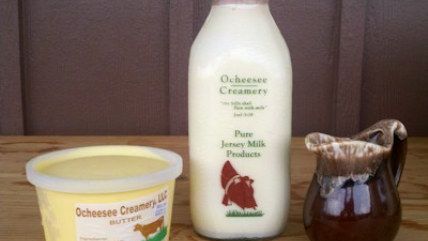Dairy Lobby Sides with Florida in Orwellian Attempt to Redefine 'Skim Milk'
According to state regulators, skim milk = skim milk + mandated additives.


Natural skim milk in Florida still can't be labeled as "skim milk." At least not yet.
You may recall the Ocheesee Creamery case, which I wrote about in April. As I described in that column, a Florida state agriculture department inspector ordered Ocheesee, a small, all-natural creamery located along the state's panhandle, to stop selling its skim milk in 2012. He claimed Ocheesee's skim milk ran afoul of Florida's standard of identity for skim milk, which requires creameries and dairies to add vitamin A to their skim milk.
Ocheesee, which prides itself on its all-natural milk, proposed to label its skim milk as "Pasteurized Skim Milk, No Vitamin A Added." The state countered with "Non-Grade 'A' Milk Product, Natural Milk Vitamins Removed" and ordered there be no mention of "skim milk" on the label. The state later changed its tune, arguing instead that Ocheesee could sell its 100% skim milk only if it were labeled as "imitation skim milk."
Finding the state's Orwellian proposals to be as untenable and ridiculous as they sound, Ocheesee—working with the Florida office of the Arlington, Virginia-based Institute for Justice—sued to overturn Florida's rules on First Amendment grounds.
A federal judge in Florida upheld the state's rules this spring. Ocheesee soon appealed the judge's decision. That appeal is pending.
Last month, Florida's lawyers argued in a filing in the case that labeling a skim milk as "skim milk," if said skim milk "fails to meet the standard of identity for skim milk," is either "inherently" or "potentially" deceptive speech the state claims "may be banned."
Nevermind that Ocheesee's skim milk meets what's been the dictionary definition of skim milk for hundreds of years.
The state went so far as to malign Ocheesee's all-natural skim milk as "an inferior product." Florida's lawyers also claim that its "unrefuted evidence shows that consumers expect skim milk to meet the standard of identity."
But that evidence has indeed been refuted. I should know. I was retained as an expert in the case, and drafted a report describing how Florida's standard of identity for skim milk misleads and fails to serve the interests of consumers. I refuted.
"Reasonable consumers have not been and would not be not misled by Ocheesee Creamery's use of the term 'pasteurized skim milk' to describe its pasteurized skim milk," I write in my report.
This past week, a global dairy-industry lobbying group added its two cents in the case. The International Dairy Foods Association (IDFA), a Washington, D.C.-based group that "represents the nation's dairy manufacturing and marketing industries and their suppliers, with a membership of 550 companies within a $125-billion a year industry," filed an amicus brief in the case.
If you thought the IDFA might have ridden in on a milk-white horse to stick up for Ocheesee, which at last count had three employees, then you're new to how the world works. The IDFA sided with Florida regulators and against Ocheesee.
I describe this case at length in my new book, Biting the Hands that Feed Us: How Fewer, Smarter Laws Would Make Our Food System More Sustainable (which you can pre-order at Amazon or pick up in bookstores on September 15). Not coincidentally, my discussion of the case appears in the second chapter, the one titled "'Big Food' Bigger Thanks to 'Big Government.'"
"It is clear that giant dairy conglomerates are scared that they might lose customers to local creameries who provide more choices and better products," said Justin Pearson, head of IJ's Florida office and lead attorney in the case, in comments to me this week.
"We see this in many of our cases. Whenever there is a ridiculous regulation, there was usually a powerful and politically connected group pushing for it, at the expense of hard-working small-business owners," says Pearson.
Sure enough.
"Food processors, such as Ocheesee, who choose not to replenish essential nutrients to the standardized level, must label those products as 'imitation,'" reads the IDFA brief, which goes on to argue that Ocheesee's skim milk is "misbranded" unless it contains the word "imitation" on its package.
Notably, Florida's long-preferred terminology for Ocheesee's skim milk—"Non-Grade 'A' Milk Product, Natural Milk Vitamins Removed"—also does not contain the word "imitation," and so would also be "misbranded" in the opinion of the IDFA.
But then, the IDFA also has what could charitably be termed as a flexible approach when it comes to standards of identity.
In 2009, for example, the IDFA petitioned the FDA to change the federal standard of identity of milk so that sweeteners like NutraSweet or Splenda could be added to milk and the resulting additive-laden product could still be labeled simply as "milk." Their position seems to be that the more additives you add to milk, the milkier it is.
The IDFA is in the business of selling milk—literally and figuratively. There's absolutely nothing wrong with that. Nothing, that is, until the IDFA works with the government to stifle competition.


Show Comments (510)